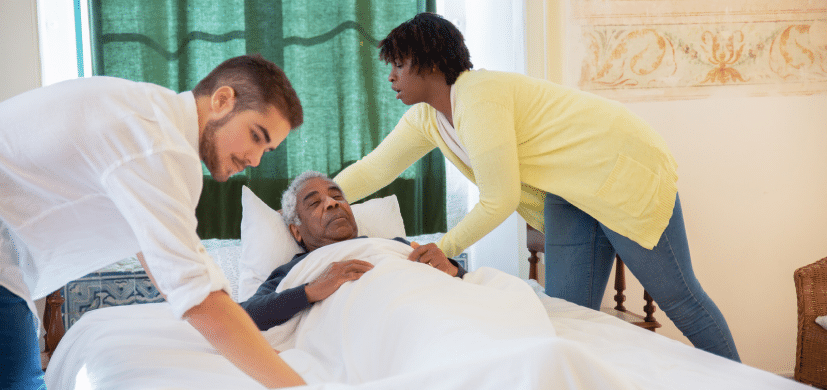Stage 4 Bedsores
Stage 4 bedsores tend to be deep and extensive. They affect deeper tissues of the body, such as bones, ligaments, and/or muscles, and can often become infected. Due to their severity, stage 4 bedsores require immediate medical attention. In some cases, surgery might be necessary. When left unattended, stage 4 sores can worsen the health of the patient or even cause death.

- What is a stage 4 bedsore?
- What do stage 4 bedsores look like?
- What are the symptoms of stage 4 bedsores?
- Who is at risk for stage 4 bedsores?
- How are stage 4 bedsores diagnosed?
- Can stage 4 bedsores heal?
- Preventing Stage 4 Bedsores
- Physical Complications From Stage 4 Bedsores
- Other Complications From Stage 4 Bedsores
- Stage 4 Bedsores Lawsuits
- Can you sue a nursing home for allowing a bedsore to reach stage 4?
What is a stage 4 bedsore?
Bedsores develop when a patient’s skin incurs extensive damage after long hours in the same position. Stages 2 and 3 can get bad. But Stage 4 bedsores, the most serious type, are deep wounds that expose vital tissues, muscle, or bone. They may develop when healthcare providers fail to treat a bedsore in its previous stages.
While the effects of stage 4 bedsores can be devastating, bedsores are both treatable and preventable.

What do stage 4 bedsores look like?
Extreme tissue damage characterizes stage 4 bedsores. The areas around the wound may appear darkened, and other signs of infections such as pus and bad odor may also be noticeable.
What are the symptoms of stage 4 bedsores?
The symptoms of stage 4 bedsores vary from one patient to another depending on their age, skin condition, underlying health issues, and the care they are receiving. The symptoms can also get worse when hygiene or medication are insufficient.
The most common symptoms for a stage 4 bedsore include:
- Bad odor
- Pus
- Redness and soreness around the wound
- A dark scar around the wound
- Blisters
- Extreme pain
- Visible tendons or bones
Patients or loved ones of a patient who notice these symptoms should notify a doctor immediately.
Who is at risk for stage 4 bedsores?
People who have had bedsores in the past are most vulnerable to developing them again in the future. This is especially true in cases where the past sores were not well treated or have not yet fully healed.
In nursing facilities, seniors left in their beds or wheelchairs for long periods of time can develop severe bedsores because of long-term pressure on the skin. In addition, people with the following risk factors are the most prone to developing stage 4 bedsores:
- Poor hygiene
- Obesity (excess weight increases the pressure against skin)
- Fragile skin
- Dehydration or poor nutrition
- Limited mobility
- Nerve damage
How are stage 4 bedsores diagnosed?
Doctors diagnose stage 4 bedsores by carefully examining the condition of the wound and the skin surrounding it. In some cases, the doctor may order a blood test to know if you have an underlying health issue that could have contributed to the wound.
However, the doctor might need answers to a few questions before diagnosing a patient with a stage 4 bedsore. For instance, the doctor may ask if the patient has had skin ulcers in the past. The doctor may also ask about the patient’s level of pain and level of mobility.
If you or your loved one has developed a painful bedsore or noticed any symptoms, the best solution is to seek medical help. A doctor can provide a detailed examination. If you believe the bedsore was due to the negligence of a caregiver, you should contact a lawyer for advice.

Can stage 4 bedsores heal?
Yes, stage 4 bedsores can heal, although the speed and thoroughness of recovery depend on multiple variables. Studies show that with proper treatment, 30% of stage 4 pressure ulcers will heal within six months. However, others may never heal entirely.
A doctor should examine the sore and explain possible outcomes and steps a patient can take to increase the chances of a speedy recovery. Treatment often involves antibiotics as well as a procedure called debridement, in which a doctor removes dead tissue from the wound in order to help it heal. Surgical skin grafts may be needed; in this procedure, healthy skin is taken from another area and transferred over the wound.
If a bedsore becomes infected, the chances are high that it will take longer to heal. The attending doctor should first treat the infection as well as any other secondary diseases that might worsen the wound’s condition.
However, in unfortunate cases, stage 4 bedsores can lead to death. In April of 2020, a woman residing in a North Carolina nursing home died due to an infected pressure ulcer. Her family is currently in the process of suing the nursing home responsible for her care for nursing home abuse.
Preventing Stage 4 Bedsores
It’s possible to prevent the occurrence of stage 4 bedsores in stage 3, before it progresses with the right oversight and maintenance. Nursing home staff should take the appropriate measures to ensure the well-being of any resident who is confined to bed or to a wheelchair. Additionally, staff should properly treat existing wounds and care for the overall health of your loved one. You have the right to ask questions, voice concerns, and address any problems you’re aware of directly with nursing home staff members or other care providers for yourself or your family member.
Friends and family of seniors in nursing homes can also play a role in preventing or recognizing the signs of bedsores by:
- Visiting as often as possible
- Checking a loved one’s skin for any changes
- Listening to their complaints and concerns regarding the care they receive at the nursing facility
- Notifying a health care practitioner immediately of any skin or health concerns
Physical Complications From Stage 4 Bedsores
Stage 4 bedsores can affect the body in several ways, considering that the sores affect vital body parts, including bones and muscles. It is especially likely for complications to arise in patients who take longer to recover fully.
Common physical complications include:
Bacterial Infections
Stage 4 bedsores can result in bone and joint infections, which may also limit the mobility of these structures. The bedsores can also cause cellulitis, a skin infection that causes numbness, swelling, and redness of the affected area. This bacterial infection can be life-threatening if not treated promptly.
Calcification
Calcification is a common consequence of long-term inflammation. This process involves deposits of calcium, which cause a hardening of the area around the wound. The build-up of calcium can be painful and can also slow the healing process.
Other Complications From Stage 4 Bedsores
Aside from physical issues, some other complications that can arise from severe bedsores include:
Mental Complications
It is not easy to deal with bedsores, especially in conjunction with other underlying health issues. The situation can cause stress and trigger possible mental health complications. This is especially true when a patient is isolated or lonely or is not receiving the proper care and treatment.
Financial Complications
Like other serious illnesses, stage 4 bedsores can drain a person’s finances. If the wound is extensive, surgery may become necessary alongside multiple medications and other long-term treatment options. The entire treatment plan can lead to substantial medical bills.
Stage 4 Bedsores Lawsuits
Stage 4 bedsores can be the byproduct of abuse or neglect by a nursing home caregiver. However, legal action may be possible, depending on the facts surrounding the specific injury. Lawsuits might allow patients to get justice and relief for the suffering they have experienced as a result of the advanced stage bedsore. With an attorney’s help, a patient might be able to determine the extent of elder abuse, get compensation and hold the nursing home and caregiver responsible.
Can you sue a nursing home for allowing a bedsore to reach stage 4?
You should seek legal representation if you or your loved one suffers from a stage 4 bedsore due to or worsened by poor care from nursing home staff. Nursing homes and their employees have a legal duty to provide adequate care in the resident’s best interest, as well as reporting malfeasance and abuse in the nursing home. When nursing home providers fail to provide the required care, they may be negligent for any injuries, including stage 4 bedsores resulting from substandard care. A lawyer may be able to help prove that a nursing care facility is responsible for a bedsore reaching stage 4.
If you or your loved one has suffered from this condition, we are here to help you. Our team of legal experts is happy to hear your concerns. Request for a free case review and get the justice you deserve.
- Last Modified April 28, 2023
- Editorial Guidelines
Dr. Patricia Shelton, MD

Education:
- University of Washington, Doctor of Medicine – MD. June 2008
- University of Washington, Bachelor of Science – BS, Jun 2003
Background:
Neuroscience and Medicine
Career:
- Dr. Shelton primarily writes content for health-related websites, but has also written test prep materials, white papers, published research articles, court documents, and more.
- Dr. Shelton teaches anatomy and physiology at the college level for the National Institutes of Health.
